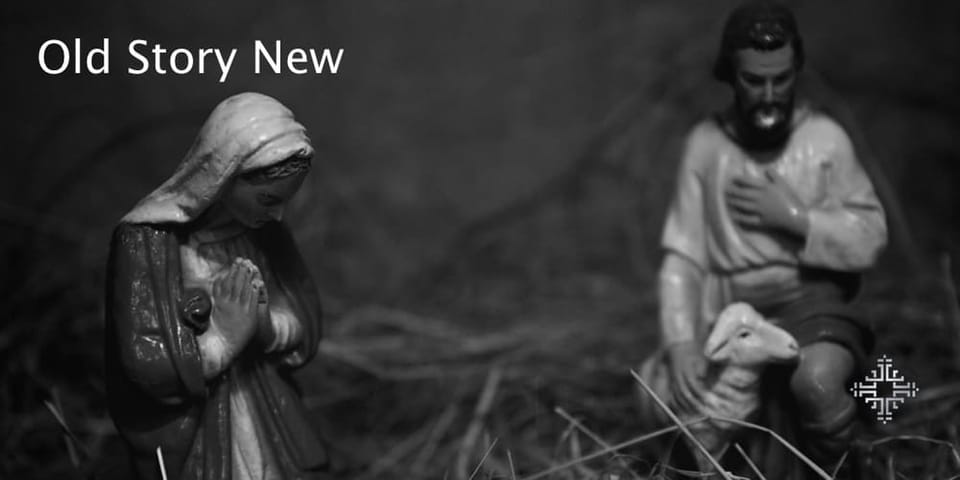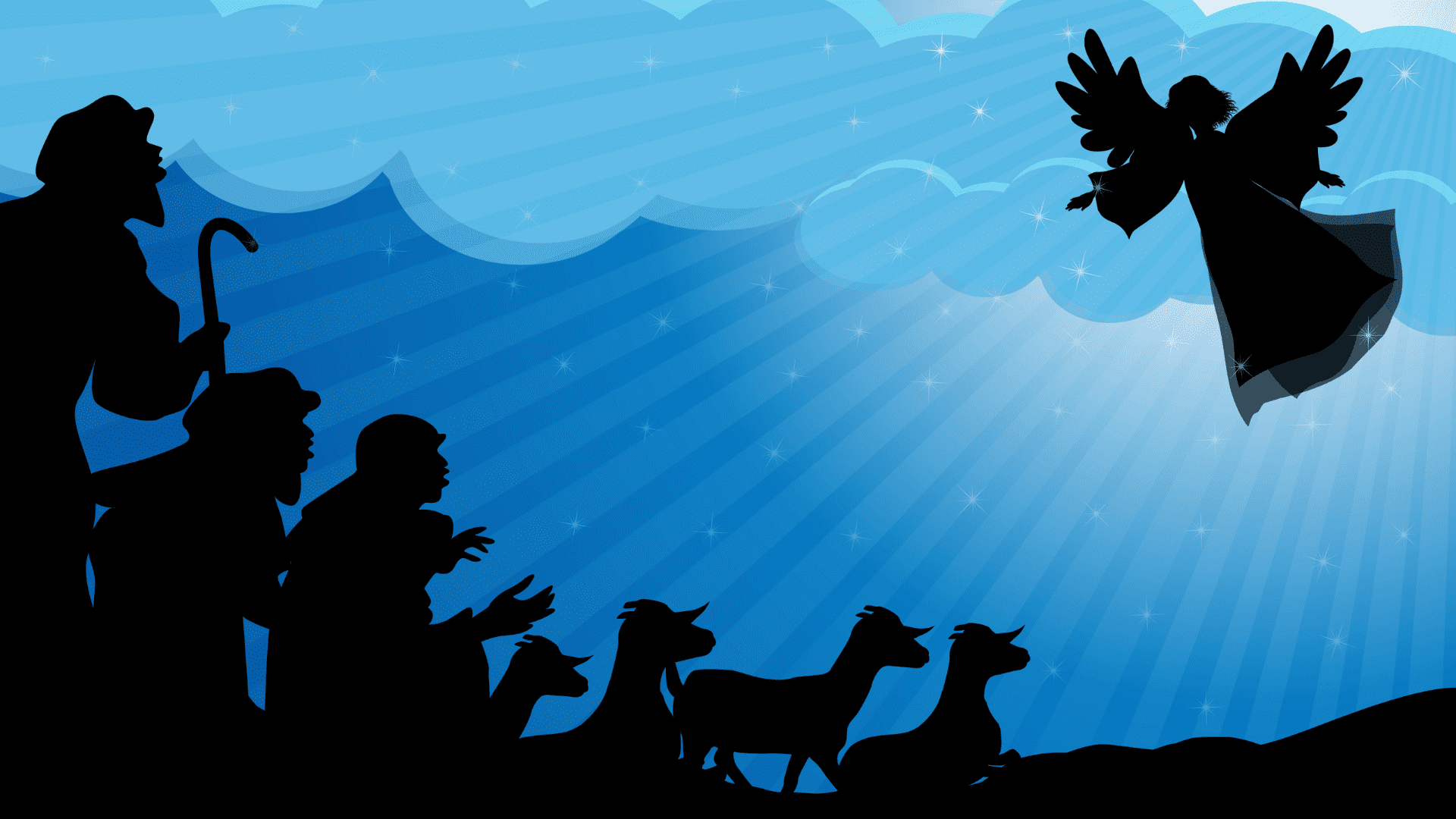Christmas for the Weak and Small (Luke 2:8-20)

Big Idea: Christmas brings God’s glory to the weak and small, and gives us the two things we need most: praise and peace.
Have you ever felt, like me, insignificant in a world of seven billion people? There are all kinds of events going on — big political and economic and social movements, led by outstanding people with lots of power and prestige — and then there’s us. It feels sometimes like our lives are small, and we wonder if they really matter.
I saw a Buzzfeed article this week that made me feel small. The article showed the earth within our solar system. But then it showed how small our earth is within our solar system, and then how our solar system is only a blip within the Milky Way galaxy. And then it showed that there are thousands and thousands of galaxies, each containing millions of stars, each with their own planets. The pictures are startling. It concludes that we are “just a tiny little ant in a giant jar.” That may actually exaggerate our size. When you look at the size of the universe, we are nothing. I certainly understand why a psalm asks this question of God:
When I look at your heavens, the work of your fingers,
the moon and the stars, which you have set in place,
what is man that you are mindful of him,
and the son of man that you care for him?
(Psalm 8:3-4)
And then there’s not just the earth’s place within our solar system, galaxy, or universe, but our place within the earth. They estimate that over 100 billion people have lived on this earth. To say that we’re an ant in an anthill exaggerates our importance, and we feel that. It’s why the great novelist William Golding said, “I am here; and here is nowhere in particular.”
And so we wonder: Do our lives matter? Does our work matter? And ultimately, do we matter? We could ask ourselves: Does this church matter?
I read this week of a pastor who, when he started out, said, “Lord, do great things through me for the sake of the Kingdom.” After graduating from seminary, he thought, “Lord do great things through me in my denomination.” After a few years in ministry, he thought, “Lord do great things through me in the local church.” Now, after a few more years of ministry, he thinks, “Lord, just help me to finish the race!” Our grandiose plans to change the world eventually give way to the sobering realization that we probably won’t accomplish nearly as much as we’d thought. Eventually we realize that we’re not even sure we canchange ourselves.
So let me ask you again: Have you ever felt, like me, insignificant in a world of seven billion people? What do we do when your life, your job, your family seem so small?
I’m asking this, because that’s the question that appears for us in Luke 2, the passage that we just read. In these four weeks leading up to Christmas, we’re discovering — or rediscovering — the original Christmas story. Last week we looked at the story of Christmas in the gospel of Matthew. I reminded us that Jesus’ birth shows that God hasn’t given up on us, and has acted on our behalf. This morning we’re looking at the account of Jesus’ birth in another biography of Jesus, written by Luke. And Luke tells us two things we need to hear: First, that Christmas brings God’s glory to weak people, and second, that it gives us the two things we need most: praise and peace.
Christmas brings God’s glory to weak people.
We are weak and small. We are just like the people we encounter in Luke 2.
In verse 1 we read: “In those days a decree went out from Caesar Augustus that all the world should be registered. This was the first registration when Quirinius was governor of Syria” (Luke 2:1-2). So here’s the deal with Caesar Augustus. His full name was Gaius Octavius Thurinus. He was the founder of the Roman empire, and its first Emperor. He had a collection of powers granted to him for life by the Roman Senate, including supreme military command, and those of tribune and censor. He reigned over a massive area throughout modern-day Europe, Asia, and northern Africa. He initiated an historic era of peace called Pax Romana (The Roman Peace), which allowed things to flourish under his reign. He enlarged the Empire, developed a network of roads, established a standing army, and rebuilt Rome. An inscription that celebrated Caesar’s birthday stated that his birthday “is a day which we may justly count as equivalent to the beginning of everything,” and that he “has given a new look to the Universe at a time when it would gladly have welcomed destruction if Caesar had not been born to be the common blessing of all men.” The decree resolves that Caesar is “a saviour for us and those who come after us, to make war to cease, to create order everywhere,” and that his birthday is the birth of a god, and the beginning of glad tidings. Luke’s story in chapter 2 is given within the context of one of the most powerful world leaders to have ever lived in the history of the world.
So that’s where Luke begins. He begins by placing the Christmas story in a landscape of one of the most powerful political rulers to have ever lived.
In contrast to this great world power, Luke introduces a bunch of nobodies. He introduces us to Joseph and Mary, an unmarried couple caught up in world events. In a chess game, Caesar would be king, and Joseph and Mary would be pawns. They travel back to Joseph’s ancestral home. We always picture Mary riding a donkey, but it’s likely they made the journey on foot. According to Google Maps — which I’m pretty sure they didn’t have — that’s a 34-hour walk. A three-day journey on foot, while pregnant. They are nothing.
They’re not the only nobodies. In verse 8 we’re introduced to shepherds living in the fields, keeping watch over their flocks by night. What’s important about these shepherds? They are the first visitors to learn about the birth of Jesus, and to visit him in the stable.
I spent some time researching shepherds. I’ve always heard that shepherds were hated — the downtrodden and the despised in that society. That’s true in later rabbinic Judaism, hundreds of years later. But it doesn’t seem to be true then. What’s true then is that shepherds were nobodies. In today’s terms, they’re the cleaners who take the TTC to work the midnight shift at minimum wage.
So you have Joseph and Mary, who are nobodies, and shepherds, who are nobodies, and Caesar, who is everything. We are supposed to identify with Joseph and Mary, and the shepherds. You have a picture like this: you are here. You are small. You are nothing in a world of big and important people. And all of this happens in Bethlehem, a place that’s away from the centre of attention as well.
But then Luke changes our perspective so that we feel even smaller. In verse 9 we read, “And an angel of the Lord appeared to them, and the glory of the Lord shone around them, and they were filled with great fear” (Luke 2:9). I once read a book about a preacher who pastored a little church in the small town of Ashton. The book was wild, because it unfolded the story down here the same time as it unfolded what was happening up there as well. There were angels and demons and battles going on in parallel with the actions of Pastor Hank and his little church. It was a weird and wild and imperfect reminder that there’s a lot more going on around us, and that we only see part of the action.
Every once in a while in the Bible, you get a parallel picture of what’s happening in heaven and on earth at the same time, and this is one of them. Heaven’s glory came to earth, and filled the night sky. The glory of God refers to the brightness that surrounds God’s revelation of himself. Throughout all the Bible, there are only a few times that we get glimpses of God’s glory: the pillar of cloud by day and the pillar of fire by night that led Israel through the wilderness; the “thunders and lightnings and a thick cloud on the mountain and a very loud trumpet blast” when Moses met God on Mount Sinai (Exodus 19:16). When Moses got a glimpse of God’s glory, they had to cover his face because it became so radiant that people were terrified. God’s glory was so powerful that even if you met someone who had seen it, you would be terrified.
When Solomon built the Temple in Jerusalem, we read, “the house, the house of the LORD, was filled with a cloud, so that the priests could not stand to minister because of the cloud, for the glory of the LORD filled the house of God” (2 Chronicles 5:13-14).
The glory of God is so powerful that the book of Revelation tells us:
And the city has no need of sun or moon to shine on it, for the glory of God gives it light, and its lamp is the Lamb. By its light will the nations walk, and the kings of the earth will bring their glory into it, and its gates will never be shut by day—and there will be no night there. (Revelation 21:23-25)
The glory of God is a stunning thing. It’s God’s self-revelation, and the smallest glimpse of it leaves us terrified. If you saw a sliver of God’s glory, it would mess you up forever. But here, God’s glory shows up. The curtain between heaven and earth is pulled back. The shepherds see God’s glory. Thousands of angels show up and announce the birth of Jesus. The word “great company” is a military term. It’s like an army of angels has shown up. It’s terrifying. It’s overwhelming.
Here’s what Luke is showing us. Christmas is about weak people. It’s about nobodies: a teenage couple giving birth in the middle of nowhere, shepherds working the night shift for minimum wage. The characters in this story are eclipsed by the glory of Caesar Augustus. And Caesar Augustus is eclipsed by the glory of God. The glory of Joseph, Mary, and the shepherds is like a speck of light shining beside the blinding light of Caesar. And Caesar’s glory is like a 100-watt light bulb compared to the blazing sun of God’s glory. Mary and Joseph and the shepherds are nothing compared to Caesar, and Caesar is nothing compared to the glory of God.
I want you to see this today, because it’s bad news that’s about to become good news. We have to understand how small we are in this world if the world is ever going to make sense. One of my favorite books from 2014, Beloved Dust, captured it well. It says that we’re always trying to escape how small we are, rather than accepting and embracing our smallness. We spend our hole lives fighting that we are limited creatures who occupy a small place in a vast world. We grasp at all kinds of things to escape our smallness. It argues that our limitedness, our smallness, our frustrations with ourselves, and our inabilities are actually gifts from God. They’re actually moments of grace. It argues that we need to learn the profound reality that:
- I am a creature.
- I am human.
- I am temporal.
- I am transient.
- I am finite.
- I am not all-powerful.
- I am not all-knowing.
Listen to this profound thought from Beloved Dust: “We cease to grasp how finite we are. When we are confronted with the loss of a job, a broken relationship, financial problems, death, sickness, frustration, and hurt of any kind and we create strategies to deal with life and try to generate a better existence, we end up dehumanizing ourselves and others. When we reject what we are, we become less than what we were made to be.”
Let me put it a different way. This morning I’ve been talking about how we are weak and small. We spend most of our lives trying to overcome this reality. We somehow think that if we do the right things we’ll escape our weakness and smallness.
But Luke and the Christmas story are inviting us into reality: that the good news is that we are weak and small. “Trying to defeat our limitedness is fighting against our nature and seeking to live against the grain of who we are.” You’ll take a lot of pressure off of yourself if you embrace your smallness and weakness. It’s not an accident. It’s how God created you. Stop trying to be something that you’re not. Embrace your smallness and your weakness. The truth about our smallness and weakness is actually a liberating one. What starts out as bad news actually becomes the best news of all.
Here’s why. Because:
Christmas gives the weak and small the two things we need most: praise and peace.
What happens when God’s glory collides with the weak and the small? Notice, by the way, that God’s glory skips right past the powerful. It’s almost like — in this story, anyways, and also in most of Scripture — that God just sidesteps the powerful, and shows up right in the middle of the small and the weak. It doesn’t hit Caesar Augustus; it comes to Joseph and Mary, and to the shepherds.
When it comes, it comes with a message that you could argue is the central theme of the Bible, the sum of God’s message to us. Here’s the message that the thousands of angels said as they appeared and praised God:
Glory to God in the highest,
and on earth peace among those with whom he is pleased!
(Luke 2:14)
I’m not exaggerating when I say that the whole of Christian Scripture, the entirety of Jesus’ life, can be summed up in this message. So let’s look at it together. It’s the two great purposes for Christmas, purposes that touch every one of us today.
“Glory to God in the highest.” The first thing that the angels do is praise God for what he’s done. The omnipotent, eternal Son of God has just “emptied himself, by taking the form of a servant, being born in the likeness of men” (Philippians 2:7). God has “sent forth his Son, born of woman, born under the law, to redeem those who were under the law, so that we might receive adoption as sons” (Galatians 4:4-5). The only appropriate way to respond is with praise to God.
So we have to begin here too. This is not a subject to just discuss and analyze. It calls for worship. Here’s what I think: Angels are pretty smart and powerful. They’ve seen a lot. I would imagine it’s pretty hard to surprise an angel. But when angels look at what God has done for us by sending his Son to us to be our Savior, they marvel. Their response is one of wonder and praise. 1 Peter 1:12 says that angels long to look into the gospel, into what God has done to save us. And they’re only spectators of God’s saving plan. We’re the recipients.
The point is this: If angels get excited about the birth of Jesus Christ and our salvation, how much more should we. If angels love to look at the work of God in saving sinners like us, how much more should we who are the very recipients of that salvation, not just onlookers. We should love to look into it and be thankful for it. Our whole lives should be ones of praise to God for what he’s done. “Glory to God in the highest!”
I’ve just finished talking about the fact that we’re small and weak. We tend to approach this as a problem. The angels here point us to a solution to our smallness and our weakness. Don’t worry about it. It’s not about us. Get over yourself. It’s all about him. Reorient your life around the glory of God, because it’s all about him, and then your smallness and your weakness won’t even be a problem. Look at the angels. See how amazed they are by what God has done by sending his Son for us. And then join them in being amazed as well. You were made to bow on your knees and join the angelic chorus in praising God for who he is and what he has done for you.
So that’s the first thing we learn. It’s one of the major themes of Scripture. Get over yourself. It’s not about you. You were meant to orbit around God’s greatness, to not just study it intellectually, but to be overcome emotionally by the reality of what God has done for you. Let it amaze you again in a fresh way.
But that’s not all: “on earth peace among those with whom he is pleased!” The peace that the angels mention is the peace that we need most of all. It’s not just an inward peace, although it includes that. It is a peace that touches every part of our lives. It’s a state of harmony between God and us, and with us and others.
The movie Unbroken is about Louis Zamperini, who was captured by the Japanese and held in a P.O.W. camp in Japan. In the P.O.W. camp, he’s brutally mistreated. Everything goes wrong. He’s stripped. He’s beaten. He’s punched in the face. One day they’re told to bathe in the ocean. As they walk into water, they realize they’re surrounded by soldiers with guns. They are sure that they’re about to be executed. But suddenly, Allied planes fly overhead. The war is over. Peace has come, and it changes everything: their status, their freedom, their relationships, everything.
The angels announce that this kind of peace has come to us at Christmas. It’s a peace with God, which is our most fundamental need. “Therefore, since we have been justified by faith, we have peace with God through our Lord Jesus Christ” (Romans 5:1). Through Jesus Christ, our sins have been forgiven. He has come to earth to bear our sins and to save us. Through Jesus Christ, we can have peace with God. God adopts us into our family. He is for us. We never have to wonder about where we stand with God anymore. This is the foundation for the peace that the angels talk about.
But it’s more than that. It begins to flood our lives with peace, a peace that is independent of circumstances. It’s what Paul talks about in Philippians: “And the peace of God, which surpasses all understanding, will guard your hearts and your minds in Christ Jesus” (Philippians 4:7). It’s the peace that Jesus promised: “Peace I leave with you; my peace I give to you. Not as the world gives do I give to you. Let not your hearts be troubled, neither let them be afraid” (John 14:27).
It’s a peace that also seeps into our relationship with others. “If possible, so far as it depends on you, live peaceably with all” (Romans 12:18).
But what’s important here is that this peace is not for everyone. It sounds shocking to say this, but it’s true. The angels say, “peace to those on whom he is pleased!” God’s peace is available to those he’s chosen. God’s peace is offered to all, but a response is required.
“On whom his favor rests.” I like that. It takes the pressure off us. A Savior has come, and he’s taken the initiative in pursuing us. One of the hardest things in the world is trying to earn someone else’s approval. It’s exhausting. You’re trying to impress someone else. You’re never sure of their response. You feel like you have to keep your guard up, that you can’t really be yourself. You’ve experienced that in a job interview or a first date, or when meeting someone you really want to impress. You’re on edge because you’re trying to earn their favor.
This passage frees us from that when it comes to God. If you are here today, if you are sensing that God is drawing you to himself, if you are sensing the beauty of Jesus, then the good news is that God is at work. You don’t have to impress him. It’s evidence that his favor rests upon you. You’re being called to respond, to receive with empty hands what Christ has done for you. Do that today. Receive it. You’ll never be the same.
Here’s what this passage tells us: Christmas brings God’s glory to the weak and small, and gives us the two things we need most: praise and peace.
I love what John Piper says about this passage:
There is hardly a better way to sum up what God was about when he created the world, or when he came to reclaim the world in Jesus Christ — his glory, our peace. His greatness, our joy. His beauty, our pleasure. The point of creation and redemption is that God is glorious and means to be known and praised for his glory by a peace-filled new humanity.
I began today by asking you if you ever feel small and weak. If you do, good news! That means that you grasp reality, because that’s exactly what you are. But here’s the good news that the angels announce: God has come to people who are weak and small just like us, and calls us to see his greatness, and promises to fill us with his peace.
As we close:
Respond and believe. Respond to what Jesus has done by sending his Son. If you sense him drawing yourself to him, don’t resist any longer. Bow your knee, and join the angels in worship so that you can receive that peace.
Worship him. You can’t look at what Jesus has done without bowing down in worship to the one who has done so much. As we respond in a few minutes, realize that you are joining angels who can’t get over what God has done. Enter into that worship today. Reorient yourself around his glory.
Receive his peace. No matter what is going on in your life, know today that he is for you. Bring yourself before him. Hand your anxieties over to him, and know that he will give you his peace even in the hardest circumstances of your life.





